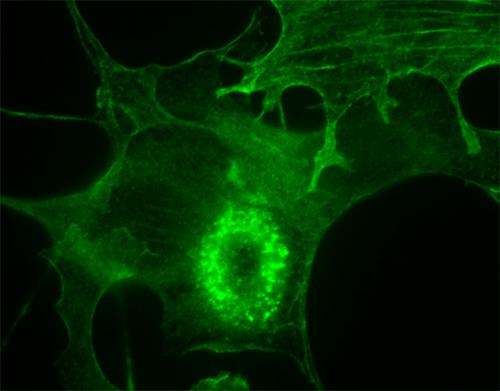Storming the gates: Study probes how pancreatic cancers metastasize

Researchers at the University of North Carolina at Chapel Hill have discovered that a protein found in the cells surrounding pancreatic cancers play a role in the spread of the disease to other parts of the body.
In a finding to be published in the March 25 issue of Oncogene, researchers in the lab of Carol Otey, PhD, found that the protein palladin enhances the ability of cancer-associated fibroblasts (CAFs) to assemble organelles known as invadopodia to break down the barriers between cells and create pathways for tumors to spread throughout the body. Otey is a professor in the Department of Cell Biology and Physiology and a member of UNC Lineberger Comprehensive Cancer Center.
"There's a growing body of literature that shows that these cells have a role in cancer formation and metastasis," said Otey.
Using both enzymatic action and physical force, the invadopodia create channels for tumor cells to migrate from their point of origin to other organs. Otey said that researchers, using cultured cancer cells suspended between layers of collagen, have been able to observe CAFs tunneling through the collagen layer and record cancer cells migrating through those channels.
In previous studies, researchers in the Otey lab and other labs have shown that CAFs surrounding pancreatic tumors express high levels of palladin. In healthy tissue, fibroblasts are the most common type of connective tissue found in mammals. In cancerous cells, CAFs are the most numerous cells found in the tumor microenvironment.
Researchers have begun focusing significant attention to the tumor microenvironment, as evidence grows that the cells and proteins found outside of cancer cells play a crucial role in tumor formation, growth and metastasis. Understanding the interplay between the microenvironment and the tumors could lead to new targets for treatment and screening, especially in cancers that are resistant to therapies that directly target the cancerous cells.
"Cells seem to be partnering together to form the tumor and promote its growth," said Otey.
Using pharmacological inhibitors and gene-silencing approaches, Otey and the research team discovered that disrupting palladin in CAFs reduced the ability of the cells to form invadopodia. Increasing the level of palladin in CAFs, by contrast, increased the rate of growth and metastasis of tumors in mouse models. Their results indicate that palladin may be part of a molecular pathway that includes two additional molecules, protein kinase C and Cdc42.
"These results demonstrate that the behavior of CAFs plays a very important role in modulating the behavior of tumor cells, and also point to a specific molecular pathway that could be a useful drug target for inhibiting tumor progression," said Otey. Since Otey discovered palladin more than a decade ago, researchers in her lab have examined the protein's role in both healthy and cancerous cells. Citing her own work, research from the Brentnall lab at University of Washington, and corroborating work such as a study from the Cukierman lab at Temple University's Fox Chase Cancer Center that found high levels of the palladin protein correlated strongly with low survival rates in renal carcinoma patients, Otey said that the evidence points toward a strong correlation between palladin expression in CAFs and the aggressiveness of tumor progression.
In future research, Otey plans to examine the levels of palladin in other types of cancer. As the Fox Chase study suggests, the mechanisms that she and her collaborators have discovered may play a role in cancers other than pancreatic.
"Knowing more about this may give us better tools to slow down metastasis," said Otey.














